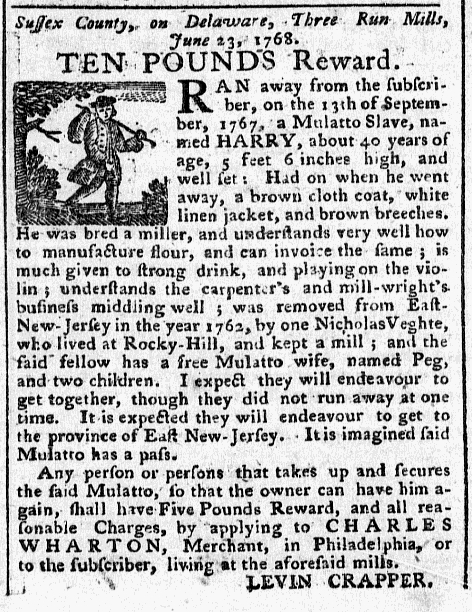Who was the subject of an advertisement in a colonial American newspaper 250 years ago today?

“RAN away … a Mulatto Slave, named HARRY.”
July 4 is the day Americans celebrate their independence from Britain. It is a familiar story about campaigns of resistance to abuses by Parliament that steadily intensified and ultimately led to a revolution against the king, a revolution that created a new nation. In the Declaration of Independence the founders asserted “that all men are created equal, that they are endowed by their Creator with certain unalienable Rights, that among these are Life, Liberty and the pursuit of Happiness.” The founding generation, however, applied these ideals unevenly to various constituencies within the new United States of America. The American Revolution launched a struggle to achieve those ideals, a struggle that has unfolded over nearly a quarter of a millennium and continues to this day. As a nation, the United States has certainly made progress, but those ideals have not been universally achieved. Unfortunately, much of that progress has come under attack in the twenty-first century, making it clear that Americans must be vigilant in safeguarding not only their own liberty but also the liberty of others as they continue to strive to achieve those ideals endorsed in Independence Hall in 1776 and promulgated throughout the new nation.
As Americans once again tell the story of their independence today, consider another story of an American who seized his freedom in the era of the Revolution. Harry, “a Mulatto Slave … about 40 years of age,” ran away from Levin Crapper on September 13, 1767. More than nine months later he had not been captured or returned, prompting Crapper to place an advertisement in the Pennsylvania Chronicle. According to Crapper, Harry possessed a variety of talents that would allow him to make a living on his own: “He was bred a miller, and understands very well how to manufacture flour.” Crapper also acknowledged, grudgingly, that Harry “understands the carpenter’s and mill-wright’s business middling well.” To offset those indications of his competence at those trades, Crapper accused the fugitive of being “much given to strong drink.”
That was not the entirety of Harry’s story. Crapper also reported that Harry “has a free Mulatto wife, named Peg, and two children.” Of all the motivations that could have prompted Harry to make his escape, reuniting with his family was probably the most compelling. Even though Peg and the children did not depart at the same time as Harry, Crapper stated that he believed “they will endeavour to get together” and flee “to the province of East New-Jersey.” Crapper suspected that Harry had a forged pass that would aid him in his flight from the man who held him in bondage.
Thomas Jefferson had not yet penned the phrase “Life, Liberty and the pursuit of Happiness” when Harry determined to make himself a free man. The Declaration of Independence had not yet been printed in newspapers throughout the colonies or read aloud in churches and town commons. Yet the Revolution had begun. Colonists had protested the imposition of the Stamp Act in 1765 and celebrated its repeal in 1766. At the time that Harry made his escape in 1767 white colonists complained about their impending enslavement via the Townshend Act and other laws passed by Parliament. Harry knew something about enslavement. He had likely heard other colonists talking about liberty and the necessity of resistance to an oppressive Parliament. In that environment, he made his own choice to seize his freedom, for himself and for his family.
There are many stories to celebrate on Independence Day. Harry managed to remain free for at least nine months. Hopefully he and Peg and the children made it to safety and he eluded capture for the rest of his life. Harry’s story is one of determination and an individual commitment to “Life, Liberty and the pursuit of Happiness” in the era of the American Revolution, a story that deserves to be told and celebrated alongside so many of the familiar stories that so many already know so well.
